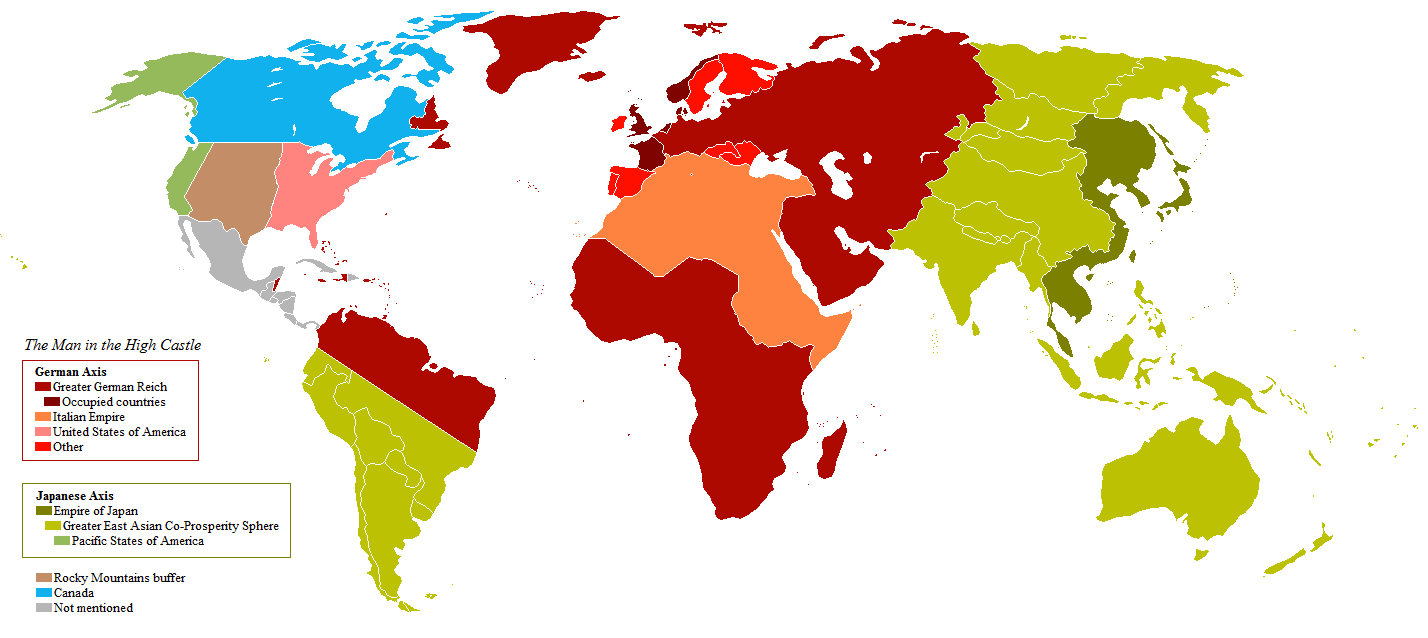SF STUDIES:
Special issue on Philip K. Dick 1975
Wikipedia map of the
world as in the Dick novel
 Source:
http://en.wikipedia.org/wiki/The_Man_in_the_High_Castle
-
Alternate
history:
Link 1: The Alternate
History list (Also see their
Introduction)
Link 2:
Wikipedia article on Alternate History
Links 3/4:
Wikipedia article on Counterfactual History
Counterfactual thinking
Note:
"Counterfactual history distinguishes itself through its interest in
the very incident that is being negated by the counterfactual, thus
seeking to evaluate the event's relative historical importance. Such
historians reason arguments for each change, outlining changes in
broad terms only, as befits a mere byproduct of the exercise.
Source:
http://en.wikipedia.org/wiki/The_Man_in_the_High_Castle
-
Alternate
history:
Link 1: The Alternate
History list (Also see their
Introduction)
Link 2:
Wikipedia article on Alternate History
Links 3/4:
Wikipedia article on Counterfactual History
Counterfactual thinking
Note:
"Counterfactual history distinguishes itself through its interest in
the very incident that is being negated by the counterfactual, thus
seeking to evaluate the event's relative historical importance. Such
historians reason arguments for each change, outlining changes in
broad terms only, as befits a mere byproduct of the exercise.
An alternate history writer, on the other hand, is interested
precisely in the hypothetical scenarios that flow from the negated
incident or event. A fiction writer is thus free to invent very
specific events and characters in the imagined history."
-
Possible worlds
theory:
Link 1:
Stanford Encyclopedia of Philosophy
Link 2:
Marie-Laure Ryan: Routledge Encyclopedia of Narrative Theory
-
Narrative style &
technique: Distinguish between
how
Dick creates an alternate history from the kind of world that
is.
-
Scenes, situations
and plot: Comment on the effect of having several narrative lines
interwoven together: that involving Childan and Tagomi, that
involving Tagomi and Haynes, that involving Frank Frink & Ed
McCarthy, and that involving Juliana and Abendsen.
-
A few questions to
consider: (1) How is Japanese colonization distinguished from German
colonization?
-
(2) How are speech habits stylized so as to characterize the
effects of colonization on speech acts?
-
(3) How are race-relations handled by the novel? And
gender-relations?
-
(4) The role for comedy, humor and irony in the novel? And
satire?
-
(5) How does the politics of the alternate history reflect on
the politics of the Cold war?
-
(6) Comment on Dick's handling of Operation Dandelion (internal
politics in Nazi Germany; relations between Germany & Japan).
-
(7) The representation of Baynes/Wegener as compared with Tagomi:
who is the more self-conflicted? Why?.
-
(8) Comment on the ironies constructed by Dick around the
reversal of fortunes between the US and Japan.
-
(9) Comment on the role of geography in Dick's handling of
alternate history. Also his use of the space exploration theme.
-
(10) Comment on the view ascribed to Captain Wegener: "On some
other world, possibly, it is different. Better. There are clear
good and evil alternatives. Not these obscure admixtures,
blends, with no proper tool by which to untangle the components"
(246). What is your attitude to his view that in an ideal world
"morality is easy because cognition is easy"? Relate that to
what is said earlier by Baynes/Wegener to General Tedeki: "We
should reflect solely on reality, on actual power. Not on
ethical intentions" (i.e. in relation to who is worse between
the German SS and the Germany Wehrmacht [the military] (190).
-
Topics
for seminar discussion:
-
(1)
The role of the
I Ching
in the novel (the relation of divination to events; of Eastern
thought by a Western author)?
-
Example:
Frank: "We bucked the moment. Bucked the Tao. Upstream, in the
wrong direction" (194). Does its use differ between him, Juliana
and Tagomi?
-
(2) The role
of commodity fetishim in the narrative.
-
(3)
The
relation of The Grasshopper Lies Heavy
to the narrative written by
Dick (the relation of alternative history to history as we know
it)
-
(4) The
difference between Dick's form of Dystopianism and that of
Burgess
-
(5) The
difference between the role of technology in Dick's narrative
and that in Miller's narrative (especially the Bomb).
|